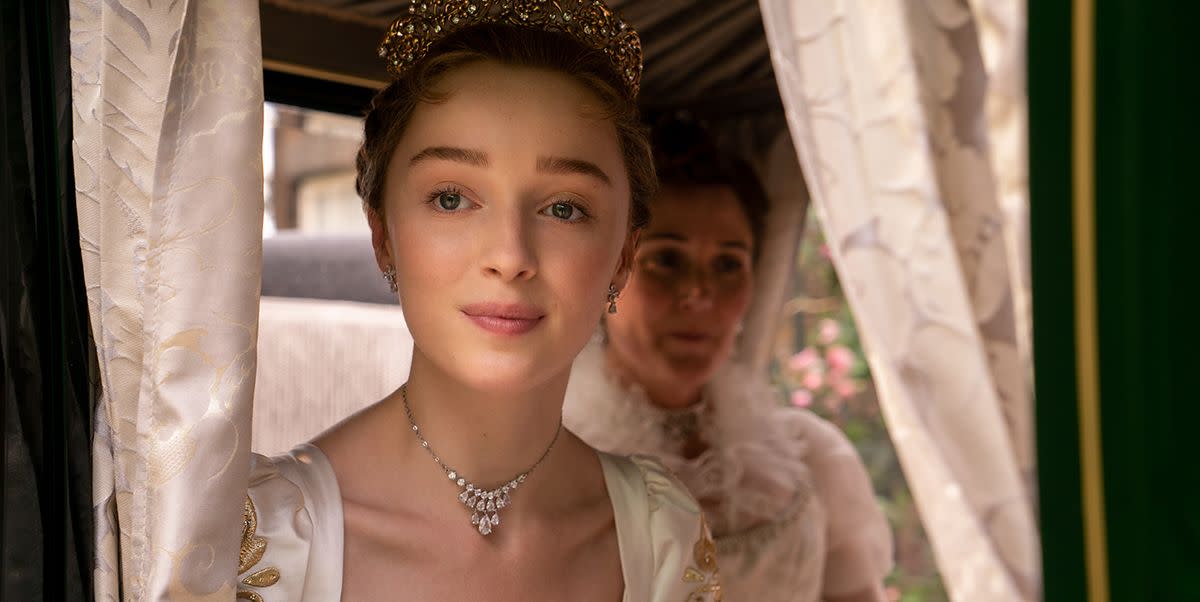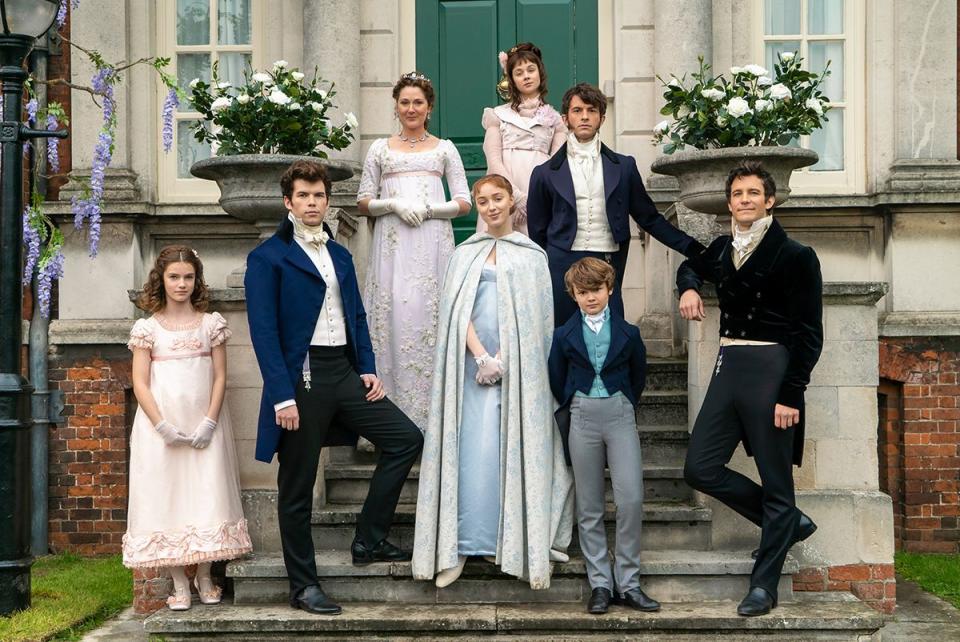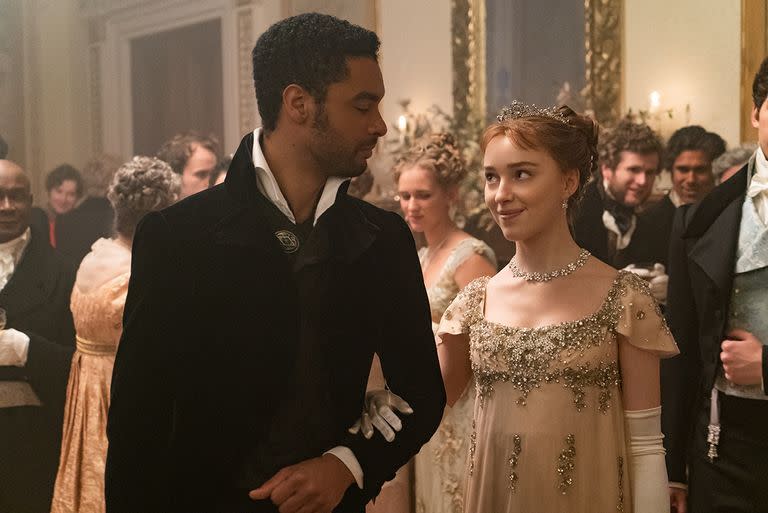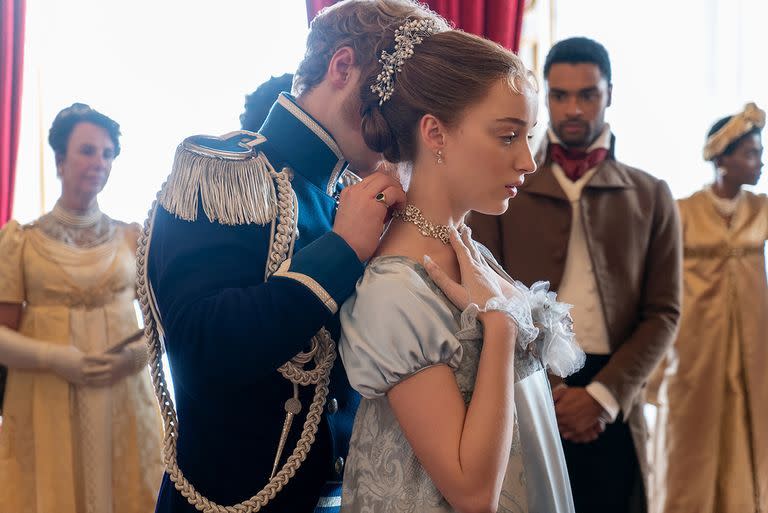Bridgerton Star Phoebe Dynevor on Upending the Traditional Costume Drama

- Oops!Something went wrong.Please try again later.
- Oops!Something went wrong.Please try again later.
Bridgerton isn’t exactly what you’d expect from a period piece. While the Shonda Rhimes-produced Netflix series (adapted from books by Julia Quinn) has the look of a Regency-era social drama, it goes deeper than many of its period-piece brethren, exploring issues of race, gender equality, and sexuality—without skimping at all on the opulent costumes, jaw-dropping sets, longing glances, or upper-class anxiety.
Actress Phoebe Dynevor stars in the series as Daphne Bridgerton, a young woman dubbed her social season’s most promising debutante. Viewers might expect her to meet suitors, giggle nervously, and eventually follow her heart to a perfect match and hulking country estate—but what Dynevor delivers is something altogether different. Yes, the series is part Downton Abbey, but it’s also got a wild side; Daphne’s a more fleshed-out character than we’re used to seeing in Regency dramas and at some steamy moments, the series can feel like Normal People in corsets. Which is all to say, it’s a delight. There’s enough storytelling candy for any fan of period pieces, and Bridgerton is brainy enough to keep viewers glued to the TV even if high-society hijinks aren’t normally their cup of tea.

Here, Dynevor talks to T&C about taking on the role, facing her fears on-camera, and how a group text helped with her history lessons.
How much did you know about the world of Bridgerton going into the series?
Not a lot. I mean, I remember I had an audition in January, I was actually in New York at the time and I filmed a tape and never heard anything back from it. And then three months later I got called in and I met with [executive producer] Betsy Beers and [creator] Chris Van Dusen and it kicked off from there. And then I chemistry read with Regé-Jean Page [who plays Daphne’s will-they-or-won’t-they love interest] the week after. It all happened really quickly when it actually happened, and so between my second meeting and the chemistry test, I read the books and got to know who this character was and what her world was like. Because from the script it felt period, but not conventionally so.
That’s something I really like about the series, that you begin thinking it’s a traditional period piece, but then it gets turned on its head.
I love that you noticed that as well, because it is intentional, which I think is really important. I think that's why you want to engage with it, because it's not covering anything up.

What makes Daphne compelling to you?
It's a coming-of-age story, but I just found it really interesting that this girl doesn't have the luxury of finding herself. She goes from living in this bubble with her family to having to find a husband and settle down. I also love the idea of her sexual awakening within that and not having a clue what those feelings are. I grew up watching a lot of period dramas and found it really interesting that you don't see women sexually finding themselves; it's all the male gaze, and I loved that this was very much the female gaze. I don't think we've seen that very much and it really interested me.
The series breaks a lot of those rules, but also definitely knows what it’s doing. So much of it, from costumes to sets, does feel like it’s done with a lot of respect for the genre.
I remember having my first fitting and being like, "Oh, my God,” because they literally built a factory just for Bridgerton costumes. So, walking into the costume department and seeing all these incredible designers just making all these clothes and creating this world, was just insane. I was so overwhelmed by it all. And then, obviously, getting to film in all the incredible locations, and the process of it all coming together was just so exciting. That aspect of the show was really fun to play with.

What was the most challenging part of the role?
There were a lot of moments like that. I was really nervous about the dancing, because I've always told myself that I’m not a dancer, so I started to believe it. We had this incredible choreographer called Jack Murphy, and we had six weeks of rehearsals before filming began. It really helped the chemistry between Regé and me because we had to learn to dance together, and that very much informed our acting relationship. There were also a lot of scenes where we had dialogue during these dance routines, which looks easy, but it's quite difficult to pull off. Those scenes where the most nerve-racking, but also the most fulfilling.
Did you do any research into the time period to inform your performance?
We all had a group chat, so we would send each other articles about women in that time and the way they dress and what they had to go through in terms of etiquette. And a lot of it was just that.
What are your own favorite period pieces?
I love a good period drama. I particularly love the Regency era. I grew up in the era of Keira Knightley, so I've seen every one of her movies a few times. I remember watching Brideshead Revisited as well when I was young. That was saying one of the shows that my dad was like, "You have to watch this," when I was in my early teens. There are just so many good ones, aren’t there?
You Might Also Like

